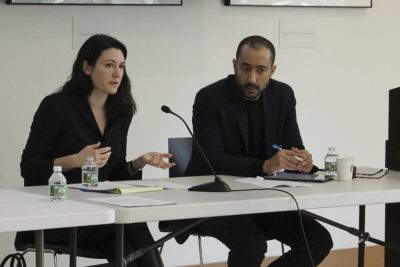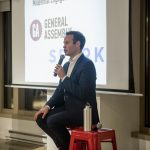
As preparations unfolded for the frenzy and celebration of the Boston Marathon on Monday, the city mourned and commemorated the five-year anniversary of the marathon bombing that killed three, injured hundreds and led to a manhunt in which a police officer was killed.
The Boston University community sponsored “The Boston Marathon Bombing: Five Years On,” an academic conference addressing terrorism and the bombing, on Wednesday. The Pardee School of Global Studies, the School of Law, the Howard Gotlieb Archival Research Center, Marsh Chapel, the BU Police Department, the College of Communication, the Pardee Graduate Council and the BU International Affairs Association worked together to host the daylong event.
The conference was dedicated to the memory of Lingzi Lu, a Boston University student who died in the attack. The event was free and open to the public.
Panels covered a variety of topics from what happened at the bombing, remembrances, the perspective of a responding police officer, terrorism in New England and the legal aspect of prosecuting terrorists.
John Woodward, Jr., a Pardee professor, was one of the driving forces brainstorming and planning the conference.
Alexander Pritzen, a junior in Pardee, is a member of BUIAA and helped organize the day. Pritzen said he was motivated to assist with the event after hearing about it from Woodward.
“We have a responsibility as being citizens or students in Boston to recognize how critical that event was on Boston history, and it’s our duty to recognize what we’ve been a part of and our city’s history,” Pritzen said. “I heard a little something like that and was like, ‘Yeah, I don’t know nearly enough about the Boston Marathon bombing as I should.’”
Many of the experts who spoke at the panels were members of the BU community, including both professors and BUPD officers.
The Rev. Dr. Robert Allan Hill, dean of Marsh Chapel, spoke at the conference, which took place in Barrister’s Hall in the School of Law. People came and went to the event throughout the day, occasionally filling up the room.
Pardee sophomore Kavya Verma attended the event, and said she believes the bombing still holds a lot of significance for members of the BU community.
“The BU community can never really be removed from this,” Verma said. “A BU student was killed in it, but also Marathon Monday is this huge part of BU tradition, and even with the fun in the back of your head, you’re always going to remember that this did happen.”
However, Verma said she feels this conference helped further connect her to what happened and she walked away knowing a lot more about what actually happened.
“This shook me. It brings you back,” Verma said. “I was thinking about how I found out about it, … and the guy who was setting up our TV told us [we] can turn it on, and he wanted to see CNN because he heard this happened. … Especially because BU has such a large population of in-state students, it’s impossible to not remember where you were that day.”
Peter Levitt, a partner at Donnelly, Conroy & Gelhaar and former assistant U.S. attorney for Boston, spoke at the panel “Prosecuting Terrorists: The Boston Marathon Bombing Case.” He emphasized the importance of educating students on the background of the attack.
“In terms of education, I think that people who attend this event are then going back and talking to their friends, to their family, on what they learned, that might make them ask questions. These type of events then resonate outside of just the people who attend,” he said in an interview.
Retrospectively, Pritzen said he was pleased with how the conference unfolded and hopes the day left a positive impact on those who attended.
“[The conference] is a tribute to the BU student who was lost,” Pritzen said. “It’s also a dedication to the fact that it’s a five-year anniversary of coming together, and I would say last, it’s a recognition [and] that we have to make sure this tragedy is part of our memory.”




